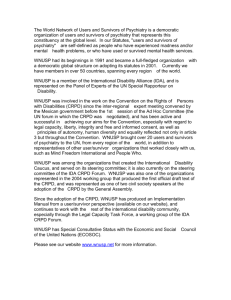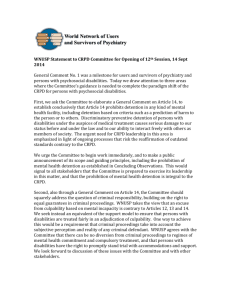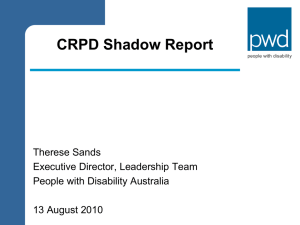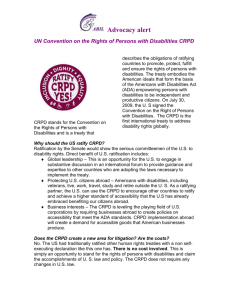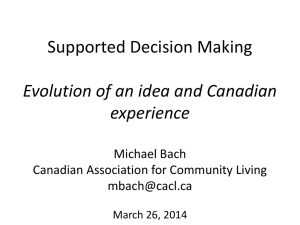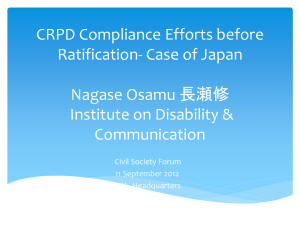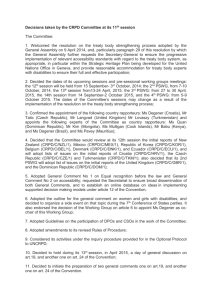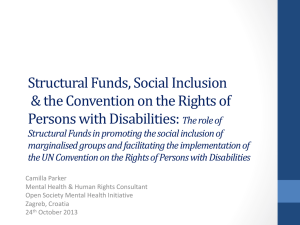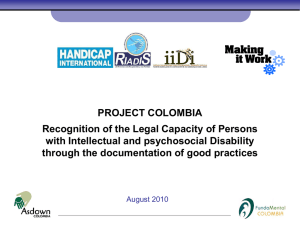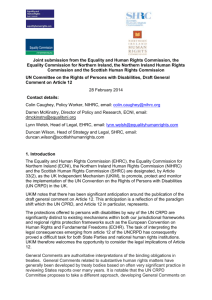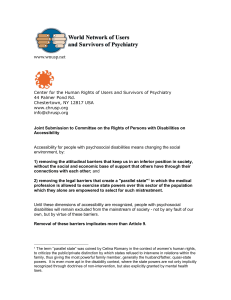word - Center for the Human Rights of Users and Survivors of
advertisement
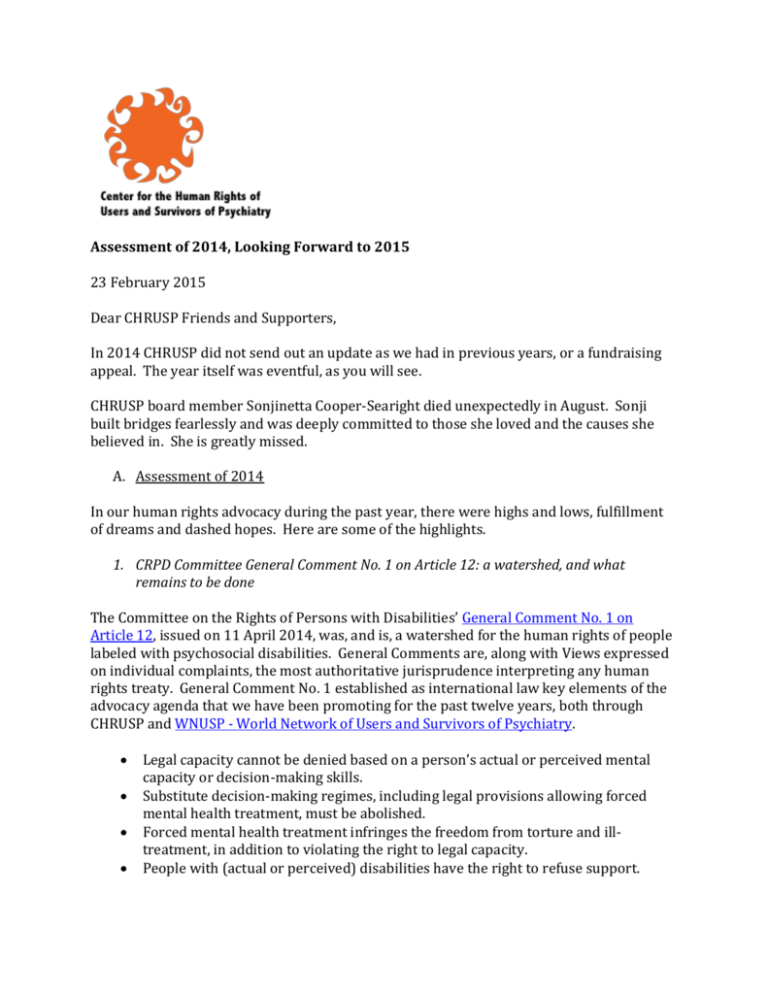
Assessment of 2014, Looking Forward to 2015 23 February 2015 Dear CHRUSP Friends and Supporters, In 2014 CHRUSP did not send out an update as we had in previous years, or a fundraising appeal. The year itself was eventful, as you will see. CHRUSP board member Sonjinetta Cooper-Searight died unexpectedly in August. Sonji built bridges fearlessly and was deeply committed to those she loved and the causes she believed in. She is greatly missed. A. Assessment of 2014 In our human rights advocacy during the past year, there were highs and lows, fulfillment of dreams and dashed hopes. Here are some of the highlights. 1. CRPD Committee General Comment No. 1 on Article 12: a watershed, and what remains to be done The Committee on the Rights of Persons with Disabilities’ General Comment No. 1 on Article 12, issued on 11 April 2014, was, and is, a watershed for the human rights of people labeled with psychosocial disabilities. General Comments are, along with Views expressed on individual complaints, the most authoritative jurisprudence interpreting any human rights treaty. General Comment No. 1 established as international law key elements of the advocacy agenda that we have been promoting for the past twelve years, both through CHRUSP and WNUSP - World Network of Users and Survivors of Psychiatry. Legal capacity cannot be denied based on a person’s actual or perceived mental capacity or decision-making skills. Substitute decision-making regimes, including legal provisions allowing forced mental health treatment, must be abolished. Forced mental health treatment infringes the freedom from torture and illtreatment, in addition to violating the right to legal capacity. People with (actual or perceived) disabilities have the right to refuse support. People with (actual or perceived) disabilities retain the right to legal capacity at all times, including in crisis situations. Detention in institutions without the person’s own consent violates Articles 12 (equal recognition before the law) and 14 (liberty and security of the person), and amounts to arbitrary deprivation of liberty. As a result of the General Comment, there is renewed excitement in our movement about the potential of the CRPD to achieve the abolition forced psychiatry, mental health detention and legal incapacitation. The General Comment is also serving as a baseline for stronger consensus in the legal community. It is very gratifying and hopeful to see these signs of progress, and at the same time we cannot rest until abolition is actually achieved. The CRPD Committee has acknowledged the need for a General Comment on Article 14, but its schedule does not permit taking on this task until other work has been completed. (The Committee had already established working groups for General Comments on Article 6, women and girls with disabilities; Article 24, education; and Article 19, living independently and being included in the community.) Nevertheless, the Committee has already gone a long way towards clarifying Article 14 in its Concluding Observations. The Committee made some new advances in its September-October 2014 session, issuing a statement on Article 14 that summarizes their jurisprudence and establishing in a number of Concluding Observations that declarations of “unfitness to plead” and the application of disability-based security measures such as a “sentence to treatment” are contrary to Article 14. The question of criminal responsibility continues to interest many experts and thinkers in the disability community, and I hope to make a contribution to the debate through an article that has been accepted for publication in the Griffith Law Review. I look forward to sharing this paper with colleagues and will be posting my author’s manuscript on the CHRUSP website. My blog post on criminal responsibility/insanity defense abolition and alternatives on Mad in America gives a preview of my thinking, and I also conducted a workshop on this issue at the 2014 NARPA (National Association for Rights Protection and Advocacy) Conference in Seattle, Washington. 2. Other Human Rights Mechanisms Struggle with CRPD Standards The UN treaty body that monitors the International Covenant on Civil and Political Rights (ICCPR), known as the Human Rights Committee, has adopted a General Comment that permits mental health detention, in contradiction to CRPD Article 14. We did our best, as CHRUSP and WNUSP, to dissuade the Human Rights Committee from maintaining destructive standard, but this time we were unsuccessful and expressed our disappointment. We believe that it is only a matter of time before equal justice will prevail throughout the United Nations human rights regime. Other treaty bodies, in particular the Subcommittee on Prevention of Torture and the Committee against Torture, have also made it known that they were considering the adoption of internal guidelines on mental health detention and/or non-consensual interventions. WNUSP expressed its concern to the SPT after reading its description of this work in annual reports, that no standards should be adopted that are contrary to the CRPD. The Working Group on Arbitrary Detention held a consultation in September 2014, in which WNUSP participated, for their development of principles and guidelines on the right to remedies and proceedings to challenge the lawfulness of a detention in court. As of this writing, the Working Group has released a draft, and public comments are due by 13 March. UN actors in the field of disability and human rights can be expected to promote harmonization with the CRPD standards. The Committee on the Rights of Persons with Disabilities has made overtures to other treaty bodies to discuss standards with them. The Disability Adviser of the Office of the High Commissioner for Human Rights, and the newly appointed Special Rapporteur on the Rights of Persons with Disabilities, can also work from their respective mandates to promote harmonization with the CRPD. 3. US Shadow Reporting Besides the global advocacy towards the Human Rights Committee in 2014, CHRUSP submitted a shadow report to that treaty body on the United States. A shadow report is a report on the human rights record of a particular country prepared by a non-governmental organization (NGO). It is the practice of UN treaty bodies to consider such reports and their recommendations, and meet with NGOs, as part of their periodic review of the country in question. Our report responded to the Human Rights Committee’s question in the list of issues asking the US about nonconsensual medication in psychiatric institutions, documenting the practice and the harm done, and asking the Committee to recommend abolition of nonconsensual practices in mental health services. Aubrey Shomo and Patricia Bauerle joined me on the trip to Geneva in March 2014, and our combined efforts went a long way to raise awareness about the impact of these violations. While Ms Majodina raised excellent questions to the US government delegation, the Concluding Observations fell short of this goal. My first response was to follow up constructively despite the limitations, but ultimately I came to believe this was not feasible. After the ICCPR review, we submitted a second shadow report to the Committee on the Elimination of Racial Discrimination. This was a wonderful opportunity to highlight the particular and disproportionate impact of forced psychiatry on people of color. Cindi Fisher and I co-drafted the report (with additional contributions and feedback from others, and several organizational endorsements), and Cindi traveled to Geneva along with Yvonne Smith for the country review. The Concluding Observations requested the US government to provide information on “the use of non- consensual psychiatric treatment and other restrictive and coercive practices on racial and ethnic minorities in mental health services” as well as “the rate at which African American children in foster care are prescribed psychotropic drugs,” which was the subject of a shadow report by another advocate. In another four years, the US will come back to the CERD Committee with its next periodic report and we will also return with more information and advocacy. Although we have not yet received the kind of Concluding Observations that would be most helpful (e.g. to abolish all coercive and restrictive practices in mental health services), we have made a good beginning raising awareness among these treaty bodies and building the capacity of users and survivors of psychiatry in the United States to work with human rights mechanisms. We have hopes for the CERD Committee next time, and will also consider a report to the Committee Against Torture the next time the US is up for review. These are the only UN human rights treaties the US has ratified. (The US has signed, but not ratified, the CRPD; both the Administration and the Senate have proposed far-reaching reservations, understandings and declarations that would seriously compromise the federal government’s understanding of its own obligations to comply with all provisions of the treaty, even if it is ratified at some point. See CHRUSP letters written to the US Senate opposing these RUDs.) 4. Other advocacy and education Three conferences in the second half of 2014 proved to be very satisfying opportunities for networking and awareness-raising: the NARPA Conference in Seattle, Washington, a conference on legal capacity held by the European Academy of Law (Europeische Rechtsacademie – ERA) in Trier, Gemany, and the ENUSP (European Network of (ex-) Users and Survivors of Psychiatry) General Assembly in Hillerød, Denmark. These experiences confirmed for me the value of paying more attention to capacity-building around the CRPD now that its obligations have been sufficiently clarified for lawyers and activists to use it with confidence to promote the abolition of forced psychiatry and all forms of substitute decision-making. At the NARPA Conference I presented a workshop on criminal responsibility (mentioned earlier) and a second workshop on developments in international human rights law, which focused on the General Comment on Article 12. The General Comment has many valuable and useful nuances that are worth studying. At the ERA conference I was asked to speak on legal capacity from a gender perspective. This prompted me to finally connect explicitly my feminist roots with the norm of universal legal capacity and explore the relationship between interdependence and autonomy from a combined feminist and critical disability perspective. The ENUSP conference was especially joyful as an opportunity to connect with users and survivors from countries throughout Europe, all of whom are actively engaged in the movement. I spoke on Understanding and using the CRPD, and held an open discussion with those interested in shadow reporting and to explore questions and concerns. A second meeting was organized in Copenhagen where I gave a similar presentation, and encouraged Danish activists to follow up on the Concluding Observations to their country, which were issued in September. 5. CHRUSP website As announced last year, I’m working with volunteer designer Nadya Gomez and volunteer coder Aubrey Shomo to create a better version of the CHRUSP website. We will keep all the features that people like about the current website, including the simplicity of design and the easy availability of resources. We are moving at a pace that works for each of us, not rushing it and making sure that the result is what we want. B. Looking Forward to 2015 I plan to attend the 2015 sessions of the CRPD Committee, and to continue supporting users and survivors of psychiatry from countries under review to engage in shadow reporting. In the September 2014 session we had WNUSP members submit information from Mexico, New Zealand, Denmark and Korea, and those from Mexico, Denmark and Korea also attended in person. It was gratifying to support this advocacy as part of a global agenda to interpret and monitor the CRPD correctly so as to enforce the full and equal human rights of people with psychosocial disabilities. Users and survivors of psychiatry from any country who are preparing shadow reports or interested in doing so can contact me to discuss mutual support and collaboration. WNUSP has scheduled a thematic briefing on Article 15, freedom from torture and illtreatment, in order to promote a deeper awareness of the impact of forced psychiatry and similar abuses as a compound form of violence, in people’s lives and in our communities. This dovetails with my increasing interest in restorative justice and Peacemaking Circles, which I am planning to also explore in greater depth including by seeking hands-on experience. Restorative justice is relevant to people with psychosocial disabilities both as victims of psychiatric violence and other serious human rights violations, and as people who are subjected to discrimination and harsh treatment in the destructive criminal justice system when we are accused of crimes. Other work that has come up just in the past month, includes: Responding to the draft of the Working Group on Arbitrary Detention; Advocacy for the upcoming meeting in the review of the Standard Minimum Rules on the Treatment of Prisoners; Consultation by the ILO on indigenous people with disabilities and access to training and employment (soliciting responses from indigenous people with psychosocial disabilities); Preparing for the CRPD Committee’s Day of General Discussion on Article 24 (Education), to be held on 15 April. Thank you for your support that has been shown in many ways financial and otherwise. If you would like to donate to CHRUSP, you may use the “Donate For Good” button on our website, or send checks to: CHRUSP 44 Palmer Pond Rd Chestertown, NY 12817 USA In solidarity, Tina Minkowitz CHRUSP President
